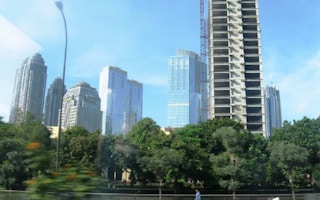The Jakarta administration has embarked on a campaign to introduce a new regulation that will require large-building owners and developers to implement environmentally friendly measures in their developments.
City Construction Supervision and Regulation Agency chief I Putu Ngurah Indiana said on Wednesday that the gubernatorial regulation on green buildings was signed in April by Governor Fauzi Bowo and would take effect in the same month next year.
“We are now introducing and explaining the new regulation. We have begun inviting developers and owners; we will continue with building managers and architects,” I Putu said.
The gubernatorial regulation No. 38/2012 will affect office, trade and residential buildings with floor widths of 50,000 square meters or more; hotels and health facilities with floor space of more than 20,000 square meters and education facilities covering more than 10,000 square meters.
The regulation, which affects both existing and planned buildings, focuses on creating greater efficiency in electricity and water use, and waste treatment.
For example, the buildings affected must not consume more than 45 watts of electricity per square meter, must optimize natural lighting, must set a minimum temperature of 25 degrees Celsius in residential buildings and must treat and make use of waste water.
I Putu said that the administration began with a limited number of target buildings and restricted the scope of green building policies due to feasibility considerations.
“This is the first time we’ve implemented a green building regulation. We’ll start with larger buildings first because their owners obviously have greater financial capability,” I Putu said.
Failure to obey the regulation will result in the agency not issuing construction permits to planned buildings or operational permits to existing buildings.
I Putu said that the city would evaluate the regulation after three to five years. “From this evaluation we can decide whether to include more buildings and or widen the scope,” he said.
I Putu admitted that the administration had yet to offer any incentives for owners to obey the regulation.
“Construction costs will be higher, but they will profit from cheaper maintenance and operational costs in the years to come,” he said.
The new regulation on green buildings is expected to help the city meet reduced carbon dioxide emission targets for 2020.
In 2010, Indonesia reaffirmed its pledge to cut emissions by 26 percent from current levels by 2020 to combat climate change.
The Jakarta administration has received assistance from the World Bank Group’s International Finance Corporation (IFC) in creating a road map that will introduce consecutively stricter regulations for buildings in the future.
Farida Lasida Adji, the IFC’s program coordinator on investment climate advice, said that they were expecting the administration to impose stricter green building regulations even earlier.
“We hope that within three years the administration will implement stricter regulations,” Farida said.
Farida explained that in the near future the city should require more buildings to comply with the green building policies.
She also expected the government to offer incentives for compliance with the policies. “In the long run, they can offer tax cuts or subsidies for the purchase of green technology products,” he said.
Jakarta administration green building checklist
- Mechanical and electrical equipment plan
- Overall distribution of temperature
- Outdoor landscape plan
- Indoor landscape plan
- Rainwater retention scheme
- Green construction activity
- Building maintenance, operational activity
- Electricity usage
- Water consumption
- Indoor air quality










